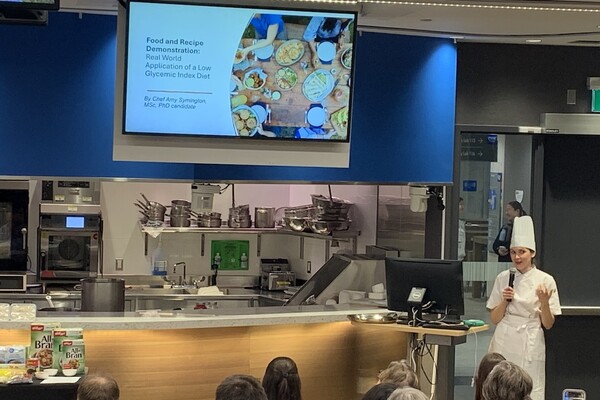Mobile Menu
- About Us
- Research
- Education
- Policy & Data
- News
- Resources
- Giving

Health care practitioners and students will learn about the gut microbiome and its role in health and disease at a University of Toronto symposium this fall. The ‘Food as Medicine’ event will highlight recent research on the microbiome, with a focus on nutrition and caring for patients with gastrointestinal conditions and non-alcoholic fatty liver disease.
“My colleagues and I are seeing more patients more confused than ever about nutrition, and it’s increasingly hard for them to stay abreast of the latest evidence and recommendations,” says Dr. Margaret Rundle, a family physician, U of T alumna and event co-founder. “We get many questions on the microbiome, but much of the available evidence is very new, so learning and sharing knowledge through events like this one is critical.”
The half-day symposium will feature presentations by researchers and clinicians, with panel discussions that include registered dietitians. Topics include fecal microRNA in intestinal homeostasis, management of inflammatory bowel disease, and the microbiome at the bedside and beyond — a talk by Rundle-Lister Lectureship Award winner and U of T Professor Philip Sherman.
Professor John Sievenpiper is the nutrition medical education coordinator in U of T’s Department of Nutritional Sciences and lifestyle medicine lead for the MD Program. He has been working with registered dietitian Rebecca Noseworthy to improve medical nutrition education and training opportunities for students, trainees, and physicians.
The pair have partnered with administrators in U of T’s medical school and Continuing Professional Development to update the nutrition curriculum in the MD program and for accredited events in continuing medical education, including Food as Medicine.

Noseworthy says that while many attendees registered for the conference are family doctors, specialists, dietitians and other health care professionals have also expressed interest. Event organizers have also reserved 20 free passes for students and trainees.
“Based on a literature review we conducted, many physicians are dissatisfied with the nutrition training they received in medical school and beyond,” says Noseworthy, a project manager in the Joannah & Brian Lawson Centre for Child Nutrition. “We’re working to fill that knowledge gap slowly but surely, and this event is one way of doing that.”
Food as Medicine will run from 1:30 to 5:30 p.m. on November 29, 2017, at the Li Ka Shing Knowledge Institute. The event is supported by the Rundle-Lister Lectureship in Transformative Nutritional Medical Education (established by Dr. Rundle and Stephen Lister), U of T’s Department of Nutritional Sciences, the Li Ka Shing Knowledge Institute at St. Michael’s Hospital, and the Lawson Centre.
Visit the Food as Medicine website for more information on the event.


